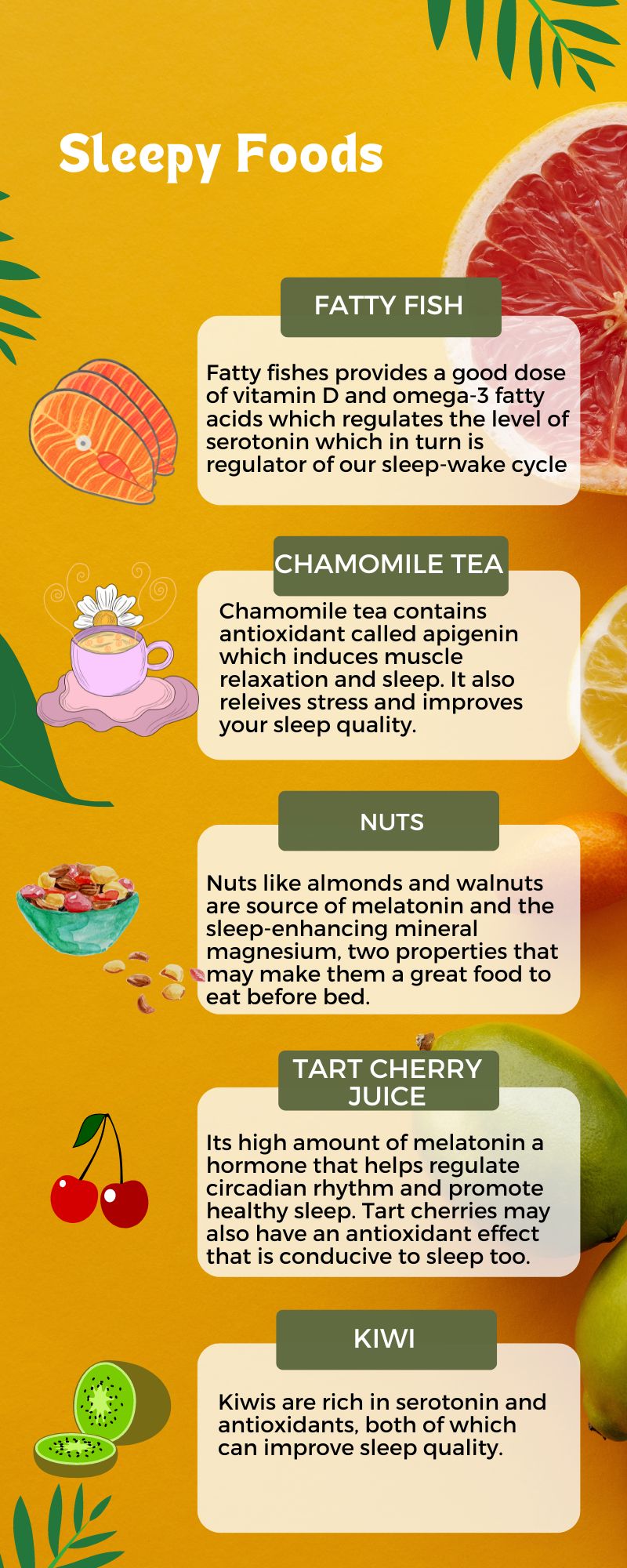Guide to your Goodnight Sleep
by Surbhi Bhoslepublished on
Photo by Egor Vikhrev on Unsplash
Most of us have experienced sleep problems at some point of time, those who haven’t are the mighty lucky ones. Having a good sleep is like an undervalued boon, you get it, you forget to be grateful about it and think that it is just another body function which you don’t have to make an effort for. But as you age or as you go through life's stressful moments caused by even the smallest of responsibility on your head you realise that such is not the case. You long for those nights when you would go to bed and even a ringing bell in the ear would not have been able to wake you up.
Though in some cases sleep disorders like narcolepsy, restless leg syndrome, sleep apnea can have causes such as genetic, neurological or hormonal but most of the sleeping problems have their roots in lifestyle and sudden changes in it. Here we will discuss what changes we can make in our lifestyle and which foods can we include in our diet to get a goody-good night's sleep.
- Same time works!: Developing a sleep routine helps the body recognise and maintain the sleep cycle. So sleep at the same time and wake up at the same time everyday, so that it doesn’t get disturbed.
- No oversleeping: As much as we worry about getting less sleep, oversleeping can also create sleep problems for you. Sleep for 12 hours straight and then you may realise the next night you are unable to sleep, disturbing your sleeping pattern which will have effects for days to come. Set no more than 7-8 hours of sleep time. It is enough for almost every body to get the body rested and energised (babies and children may require more)
- Be active: Walk more, exercise for at least half an hour a day and let go of a sedentary lifestyle. Staying active promotes better sleep. However one point to note is that exercising close to your sleep may hinder the sleep process as it may increase mind alertness and body temperature.
- Relax before sleep: Relaxing before sleep hours will create a sleep conducive mind and body state. Try out different relaxing techniques like meditation, simple deep breathing, hearing to soothing music, taking a bath before sleep time and see what works well for you. You need to find ways to leave your worries and stress outside your bedroom. Worries and stress stimulates your mind alertness greatly and hinders the sleep process. Journaling and jotting down your thoughts and worries before sleep may also work wonders for you. I find reading books (on non electronic devices) to be my ultimate sleeping pill, try it out!
- Invest in your sleep room: Not talking about investing money but efforts! Yes you need to create an environment which also promotes sleep and relaxation. Having a cluttered and messy bedroom is a strict no no. Clean up your bedroom everyday before you go to work or after you come home, so that when you go to sleep, you can actually sleep in a refreshing and relaxing ambience. Apart from hygiene, you should regulate the temperature according to your comfort, have blinds installed in your bedroom windows so that outside light will not cause any problems, use a night reading lamp if you read before sleep, avoid bright lights in the bedroom, use ear plugs if required, disheartening but keep TV out of your reach while sleeping, in short you need to create a sleep friendly bedroom!
- Oh, almost forgot to draw your attention to one of the most important and highly underrated factors that contributes towards bad sleep, the bed in which you sleep. Yes, here you might have to invest monetarily as well here, but nowadays there are many sleep friendly ortho options available for mattresses as well as pillows. Make sure to find out the best one for you and bring it home because you are contributing ultimately towards your good health.

- Some damaging things to avoid:
- Avoid taking long naps during the day. A short power nap of about 20 mins to half an hour is fine, especially older people may need it as their night sleeping hours usually gets shortened with age. If you feel your mind is overworked and shutting down, a short nap is recommended, although those already facing sleeping problems at night try not to sleep during the day.
- Avoid screens (phones, tv, laptops, any bright light emitting screen) at least an hour before sleep. The bluelight will mess up with your sleep cycle majorly hindering the initiation of it.
- Avoid consumption of alcohol and quit smoking! I don’t want to be lenient here and tell you to avoid smoking just hours before your sleep, I want you to give it up forever. I understand for smokers I am just one more person to tell you to give up on smoking but every try and every effort counts for making somebody give up on such a vastly self sabotaging habit/addiction.
This article is still about sleeping and so to add to one more con related to our topic, nicotine is a stimulant and which will make you stay awake for longer and make it difficult to fall asleep along with messing up with your REM sleep. Smokers are prone to waking up frequently during night sleep and having a less deep sleep.
About alcohol consumption, don’t consume it in the evenings. Preferably keeping a 4 -5 hours of gap before going to bed is advisable. Although you may argue that it just puts you to sleep quickly but though initially sedating it disrupts your REM sleep, decreases your overall sleep quality and you may find yourself tired and unfocused the next day. According to the sleep foundation, consuming even a low amount of alcohol (less than 2 drinks for men and less than 1 drink for women) decreases the sleep quality by 9.3%.
- Avoid having heavy meals and caffeine as you come closer to your sleep time. It is generally healthy to eat less at night. Your body’s metabolism slows down at night and it prepares for sleep, but eating heavy will make your body work more to digest and it will find it harder to fall in rest mode and sleep. Eating heavy might result in acid refluxes and heartburn making it very uncomfortable for you to sleep.
Also, I would suggest you cut down your caffeine intake especially after the afternoon. We all know caffeine is a stimulant and stays for fairly long in our systems, so avoiding it completely as you come close to evening time is better for your sleep.
- Do not take any unprescribed medications that can affect your sleep. Whether you are taking medication to sleep or to self-treating any other condition, I strongly would recommend consulting your doctor especially when you are already experiencing sleeping problems.
- Avoid drinking too much water just before sleeping. Although drinking water does help the body in staying hydrated throughout the night when you sleep, drinking a lot can cause you to get up more often for urine breaks and disturb the sleep. Instead I would suggest to keep drinking water throughout the day regularly to keep your body well hydrated and to avoid consuming it 1-2 hours before sleep. If you feel thirsty just before sleeping you can have a small glass of water.
- Last one but an important one is to stop worrying about not getting enough sleep. Worrying about it may lead to stress and anxiety which further will contribute to the condition. If you are unable to control it and getting stressed, it's best to see a therapist or a sleep expert.
- For new parents: If you have an infant at home, it's difficult to get that 7-9 hours of sleep in a stretch, sometimes there is absolutely none, especially when your child has fallen ill. This is a whole giant topic in itself but help is certainly available. I can give you a few pointers (all the above tips are also to be paid attention to) but you can also join support groups of new parents and even consult a specialist, as at such vulnerable times you need motivation the most. Let’s scroll through some tips.
- Sleep when your baby is sleeping and instead of thinking like all other parents often do, that is to complete the house chores in the meantime, i would strictly suggest against this. Sleep and rest should be your first priority at such times.
- Take all the help you can. Do not hesitate to ask for it from your family members and friends. Take assistance from a helper if you can. There is nothing wrong in it because you need to be physically and mentally fit in order to provide the best care to your newborn.
- Share nighttime duties.
- Keep the baby in a separate cot/crib but near your bed especially if you are breastfeeding.
- Keep your baby active and alert during daytime as much as possible and create a calm, cool and dim environment as the evening approaches. This will help them understand the day-night difference and also make them sleep for longer stretches at night.
- For night shift workers: Now the difficult case of night shift workers. Although all the points remain the same, replace ‘night’ with ‘sleep time’ when you find one on the page. Two additional points for them though:
- One additional thing is to create a disturbance free environment for sleep. So you need to convey the feelings to your family members, friends or the roommate so that they abide by. And if you are a pet parent figure out a way to keep them out of the bedroom or in silent mode while you sleep.
- Regulating your light exposure will help you a lot in forming a sleeping pattern and setting up your body clock accordingly. Have enough bright lights around while working at night. Exposure to even an artificial bright light can trick the circadian pacemaker in your body to take it as sunlight and thus helps maintain the sleep wake cycle. Also if you go out to work and come back when it is sunny outside then wear sunglasses and dim your environment as you near your sleep time. This will help you in falling asleep effortlessly.
These are lots of points but certainly sustainable changes to pay attention to and make them a part of our lifestyle. It's worth remembering that we are making these efforts for our health, the sole most important thing. Also, I could not stress enough to keep on following the routine based on the above suggestions and be consistent. Sometimes all you require to lead a healthy life is to be consistent in developing small habits which promotes health.